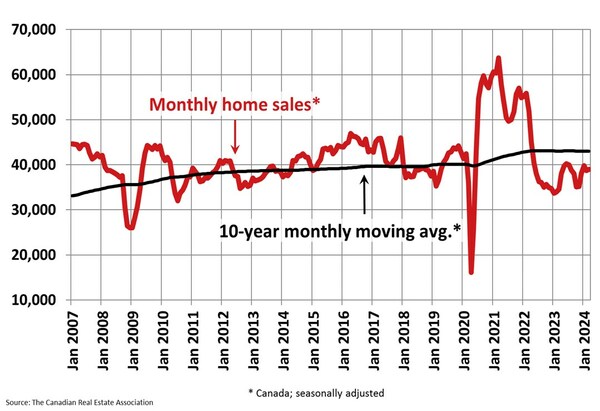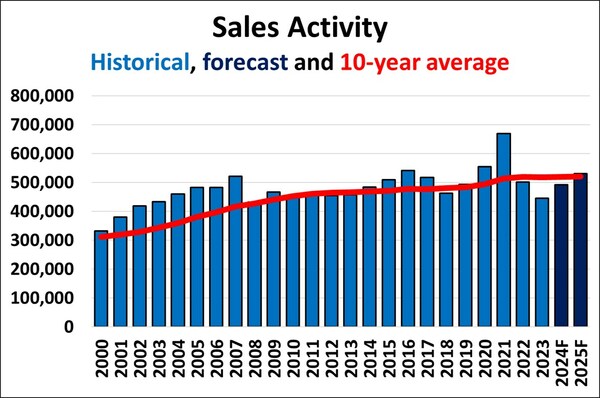While there are expectations the Canadian housing market will pick up on some level this year, home sales and prices were mostly unchanged on a month-over-month basis in March 2024, according to the latest data from the Canadian Real Estate Association (CREA) released on Friday.
The report said home sales activity recorded edged up 0.5% between February and March 2024, holding around 10% below an average of the last 10 years.
The report said the National Composite MLS®Home Price Index (HPI) was mostly unchanged on a month-over-month basis in March 2024, dipping 0.3%.
“We’ll have to wait for the April data to really understand how buyers are responding to all these new properties for sale, but if you look at last spring as a guide and add to that record population growth in the last year and a central bank that is far more likely to cut this summer than raise like it did last year, it could get interesting,” said Shaun Cathcart, CREA’s Senior Economist. “Will the story be high interest rates keeping a lot of people on the sidelines this year, or the much expected and anticipated first rate cuts enticing a lot of people back into the market? Probably a bit of both.”
CREA said the number of transactions came in 1.7% above March 2023. That was a much smaller gain than those recorded in the previous two months, although a part of that does reflect a mostly inactive market during the Easter long weekend.
The number of newly listed homes declined by 1.6% on a month-over-month basis in March.
“With sales edging up and new listings falling in March, the national sales-to-new listings ratio tightened to 57.4%. The long-term average for the national sales-to-new listings ratio is 55%. A sales-to-new listings ratio between 45% and 65% is generally consistent with balanced housing market conditions, with readings above and below this range indicating sellers’ and buyers’ markets respectively,” said the report.
“There were 3.8 months of inventory on a national basis at the end of March 2024, unchanged from the end of February. The long-term average is about five months of inventory. The actual (not seasonally adjusted) national average home price was $698,530 in March 2024, up 2% from March 2023.”
According to the latest quarterly forecast also released by CREA on Friday, interest rates are expected to continue to be the major factor affecting Canadian housing markets into 2024 and 2025.
Many Canadian housing markets have been quiet since the Bank of Canada’s summer rate hikes last year. Interest rates have been the major factor affecting markets over the last few years, and this is expected to continue to be the case in 2024 and 2025, it said.
“Expectations around the timing of the first rate cut in 2024 seem to have solidified to the second half of the year, and financial markets are currently pricing in about 50 basis points of cuts by the end of 2024. CREA’s March 2024 statistics release, reflected a bounce in new supply around the second week of March followed by a surge in sales in the last week of the month, and a significant jump in listings in the first week of April; giving the appearance the market could be gearing up,” it said.
“Some 492,083 residential properties are forecast to trade hands via Canadian MLS® Systems in 2024, a 10.5% increase from 2023. This is mostly unchanged from CREA’s previous forecast. The national average home price is forecast to climb 4.9% on an annual basis to $710,468 in 2024.
“National home sales are forecast climb another 7.8% to 530,494 units in 2025 as interest rates continue to decline and approach more normal or “neutral” levels. The national average home price is forecast to rise by 7% from 2024 to $760,120 in 2025.”
Meanwhile, Royal LePage released a report as well on Friday saying the national aggregate home price expected to rise 9.0% year over year in Q4 of 2024 (up from previous forecast of 5.5%)
According to the Royal LePage House Price Survey, the aggregate price of a home in Canada increased 4.3 per cent year over year to $812,100 in the first quarter of 2024. On a quarter-over-quarter basis, the national aggregate home price increased 2.9 per cent, an indication that sidelined buyers are rebooting their real estate purchase plans ahead of expected interest rate cuts, as predicted in January.

Phil Soper
“Consistent with our previous forecast, the market did reach a critical tipping point in the first quarter of 2024, when home prices bottomed out and began to appreciate again. Clearly, more and more buyers are motivated by the need to get ahead of rising home prices, rather than adopting the strategy of waiting for mortgage rates to fall,” said Phil Soper, president and CEO, Royal LePage.
“Many consumers – particularly first-time buyers – who have the capacity to transact have accepted and adapted to the higher borrowing cost environment. Thus, the modestly-rising home prices we are experiencing today. Once the central bank does make a move, and that first highly-anticipated cut to rates is made, even if it is only by 25 basis points, I expect we will see the price appreciation curve steepen upwards when the highly rate-focused crowd jumps into the market.
“While real estate boards across the country are reporting a boost in listings, which is typical as we head into the spring market rush, just about every region from coast to coast remains chronically short of housing supply. While we expect that interest rate decreases will draw more buyers back into the ring, this will not be the primary driver of rising home prices – it is the severe shortage of housing in markets small and large in virtually every part of the country that remains the main culprit.
“Given the strong start to 2024, the cadence of the market for the balance of the year points to a normally busy spring market that will lead into an uncomfortably busy fall. It is clear we are rapidly transitioning away from a buyers’ market and back to an environment where the seller has the upper hand.
“Homeowners who took advantage of the historically-low mortgage rates at the beginning of the decade have soberly accepted that their upcoming renewals will mean higher borrowing expenses. We do not see this as a material drag on the housing market. Two years into the post-pandemic period, about half of mortgages have rolled off those record lows, and Canadians continue to meet obligations to their lenders, with the national mortgage default rate remaining at near historic lows. Further, income growth and the period of flat home prices have helped to mitigate the impact of increased mortgage costs. People will go to great lengths to hang onto their homes, so we can expect a pull-back in discretionary spending, including on travel and entertainment.”

Mario Toneguzzi
Mario Toneguzzi is Managing Editor of Canada’s Podcast. He has more than 40 years of experience as a daily newspaper writer, columnist, and editor. He was named in 2021 as one of the Top 10 Business Journalists in the World by PR News – the only Canadian to make the list. He was also named by RETHINK to its global list of Top Retail Experts 2024.
About Us
Canada’s Podcast is the number one podcast in Canada for entrepreneurs and business owners. Established in 2016, the podcast network has interviewed over 600 Canadian entrepreneurs from coast-to-coast.
With hosts in each province, entrepreneurs have a local and national format to tell their stories, talk about their journey and provide inspiration for anyone starting their entrepreneurial journey and well- established founders.
The commitment to a grass roots approach has built a loyal audience on all our social channels and YouTube – 500,000+ lifetime YouTube views, 200,000 + audio downloads, 35,000 + average monthly social impressions, 10,000 + engaged social followers and 35,000 newsletter subscribers. Canada’s Podcast is proud to provide a local, national and international presence for Canadian entrepreneurs to build their brand and tell their story







